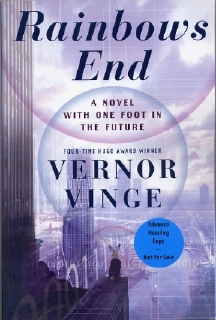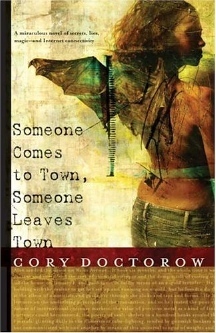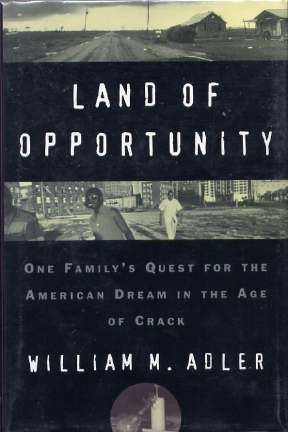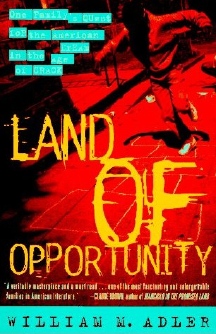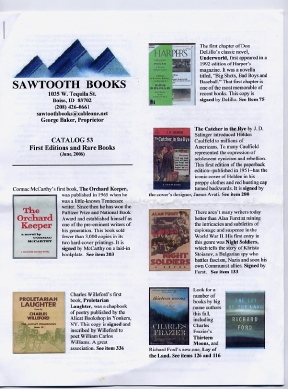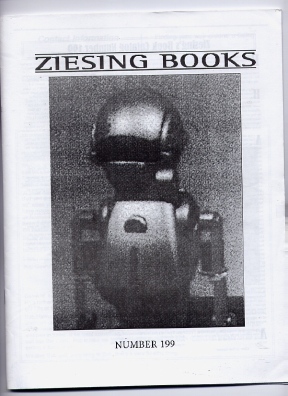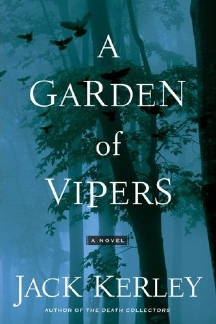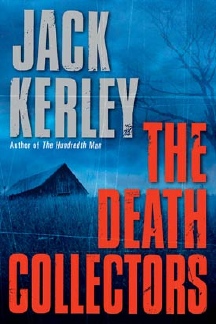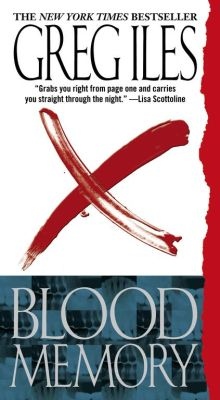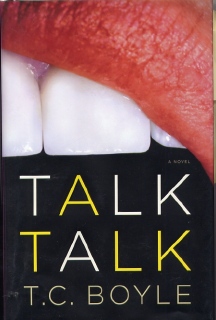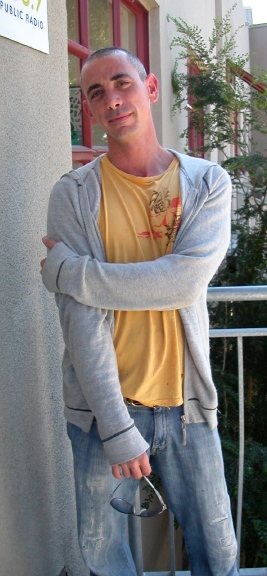|
|
|
This Just In...News from the Agony Column
|
07-22-06: Planned Adolescence: Singularity 101 for NPR |
||||
A
Report for NPR
This report features Vernor Vinge and Cory Doctorow, helping to explain to listeners who are not immersed in science fiction just what the technological singularity is, where the idea originated in Vinge's work, and how it plays out a bit in the literature. I've titled the piece "Planned Adolescence", after the notion that the post-humans will be both literally and figuratively humanity's children–perhaps your grandchildren. We must try to raise them as if they are our children, but expect some rebellion, because you cannot plan adolescent behavior. We've got to be prepared to be unprepared. But what drives the pieces are the interview excerpts from both Vinge and Doctorow, two ultra-intelligent and engaging speakers. Even if you manage to catch the report when it is broadcast live, you can email the link from the NPR web page–and you should to as many people as possible. NPR measures the interest in a subject in part by the response on "email this link" web page. If they get a huge response to this article, they'll understand that their audience is indeed interested in hearing about science fiction literature on NPR. The report itself is a labor long in the making, and it has gone through many revisions. I have to thank my fine editors at NPR who work tirelessly to support my reporting. Readers might glean that my reports are a bit out of the norm for NPR, but I do think that NPR's audience is interested in the cutting edge of fiction, in authors like Vinge and Doctorow (and all the others I cover here) who use their literary skills to consider our world in an imaginative manner. So: Listen. Then, email the story. I'll provide the link as soon as I get it. In the interim, prepare to be unprepared. |
|
07-21-06: We're Still Living in a 'Land of Opportunity' |
||||||
William
M. Adler Unleashes the Inner (City) Capitalist in All of Us
'Land of Opportunity' is a family story, the story of the Chambers Brothers of Detroit in the 1980's, a couple of shit-poor black kids who had the hustle and bustle to eke their way to the top of street society as the premier dealers of crack cocaine in Motor City. But Adler's book, novelistic in form, is much more than the usual true-crime shtick. It's a powerful story of the rancid rot that can empower American capitalism and cause it to flourish in climates where one might hope it would wither. But American Capitalism is a hearty weed, and it grows well anywhere. Even, perhaps especially in an environment like inner city Motor City, circa 198x. Billy Joe Chambers arrived in 1978. By 1982, he was selling marijuana, and by the summer of 1984, he was dealing in crack cocaine. It took him a couple of months before he'd come to believe, but once he got going, he set up a business that mirrored many of the legitimate operations going up in the 80's. Joined by his brothers David and Larry, the latter fresh out of Leavenworth, Billy Joe soon found himself pulling in $30 grand a day through his first crack house. In the mode of a true entrepreneur, he soon opened five additional houses. And more after that. And more.
Driving the action is Billy Joe Chambers, who was interviewed extensively, as were most of the principals. He's a scary but charismatic figure, smart and driven but strangely cautious. At first he wants nothing to do with this new drug. But once he realizes the economic possibilities it offers him as an entrepreneur, he embarks on a surprisingly conservative campaign to turn a profit. As his profits grow, as his organization expands, Adler offers readers a wildly skewed vision of the virtues of the profit-driven life. It helps that Adler laces a certain amount of dry humor into his work, and that the brothers themselves were so both obstinately practical in their single-minded pursuit of success. Adler himself is just as successful as his subjects. He paints a picture of a 'Land of Opportunity' where there are no holds barred, where success is money and money is success regardless of context. In fact, that might be the best way to get a grip on what's so compelling about 'Land of Opportunity'. Adler marries context to content as he celebrates the Great American Dream. His newest book, from 2001 is 'Mollie's Job: A Story of Life and Work on the Global Assembly Line'. I'm guessing it will be just as pertinent, just as gripping ten years down line as 'Land of Opportunity' is at this moment. 'Land of Opportunity' does what great books do. It tells us something about ourselves, something we need to know, but don’t want to believe. Read it in this book. Believe it. This is capitalism. This is capitalism on drugs. Any questions? |
|
07-20-06: All Hail the Catalogue Kings |
||||||
Hard
Copy, Easy Sales
It's also why I love booksellers who send you catalogues. Not email catalogues, but hardcopy printed catalogues that can go where I go, er, even when one must as it were, go. Likesaytothegrocerystore, for example, to send in one of the kids to pick up milk or whatnot. They shop and I can sit and read through the latest in-my-hand catalogue about books. The thing about paper catalogues is that they’re no-tech. They work in and by themselves, and you can browse through the same catalogue endlessly, daydreaming over the day you're going to buy... ...A first edition of 'Animal Farm', for example,. And such a deal for only $200 from George Baker's Sawtooth Books, who since I bought, I think, an Ishiguro first from them, have been dutifully sending me catalogues at intervals I can't quite fathom but nonetheless observe. Their latest, Catalogue 53, June 2006 is chock-a-block with droolworthy items that seem to me eminently reasonably priced. Yes, 'Animal Farm' is a first American Edition. Still, think of it. A piece of indelible history that you can hold in your hands. Now, yes, the most pertinent part of the novel is contained within the words. I admit that. But first editions hold a tremendous power. The first instance of an important novel, a timeless novel is an artifact of its time and place. It's like an anchor to drag you the febrile, wild-eyed book reader and now (given that we're talking about first editions) book collector a direct path into the past, into the times and mind that created a timeless work. It's like owning an original by Monet, or as close as you can get in the world of books, and that's close enough for me. Even if you can't afford them, even if you don’t want to afford them, cruising through the items in a catalogue like that supplied by Sawtooth Books is an experience both satisfying and educational. Also, you never know when you'll come across something that you is both necessary and affordable. Sawtooth Books seems to carry a pretty wide selection of books, many of them reasonably priced first editions of great stuff; for example, they’ve got a $75 signed ARC of David Mitchell's 'Ghostwritten'. It seems like a deal to me. Or, if you've got the kind of money that makes a signed, first edition of Cormac McCarthy's first novel, 'the Orchard Keeper', at $4000 a possibility then, frankly, I can't think of a better way to spend said money. The gravitic pull of such an item might bend the foundations of your house, though. Or tweeze your dreams.
The thing about book catalogues, aside from their totally helpful portability, is that they are just about the only one-hundred percent book-reading writing that cuts totally to the chase of what readers want. Books. Ziesing and Sawtooth are using the very same technology that makes books themselves so wonderful. Language, a helpful image, and pieces of paper stuck together in such a manner as to be readable. What more could we ask for from life? Well, that Orwell first edition for starters. I confess to having the Gibson already, and should you ask, yes, the gravity around that part of the bookshelves is kind of funny. |
|
07-19-06: Growing a Garden of Mysteries |
|||||||
| Curling
Up With Kerley and Iles
by Terry Weyna
Sometimes, though, a favorite author will stumble, and I'm afraid that's what Jack Kerley has done in his latest novel, 'A Garden of Vipers' (Dutton, 352 pages, $24.95). I only discovered Kerley a short while ago, and found both 'The Hundredth Man' (Signet, 416 pages, $7.99) and 'The Death Collectors' (Signet, 400 pages, $7.99) to be excellent specimens of the genre. Carson Ryder and Harry Nautilus make a good team. They are a pair of police officers in Mobile, Alabama, who are usually called upon to solve the most bizarre cases through the Psychopathological and Sociopathological Investigative Team – fondly known throughout the department as “Piss-It.” Ryder narrates the first two mysteries, usually telling us much about his thoughts, his feelings and his relationships as about the investigation itself; but this time he simply narrates a plot, for the most part, despite the fact that that plot calls for much more soul-searching than we get. But Ryder doesn't tell this story all on his own. Kerley has made the odd decision to change the narrator from chapter to chapter in this volume in the series, with some chapters told from the third-person perspective of “Lucas,” of whom we know nothing at first, and, late in the book, some chapters told from the third-person perspective of Nautilus. Complicating the mystery is Ryder's love life, which in previous books has been interesting to follow, but which here seems artificial and without feeling. There is no real puzzle to the book, and the last few chapters are so bizarre as to make the suspension of disbelief extraordinarily difficult. I was disappointed in such an odd book after the pyrotechnics of 'The Death Collectors'.
But the format couldn't spoil the book. While Iles gets off to a slow start, 'Blood Memory' soon becomes unstoppable. It begins when Cat Ferry, a forensic odontologist, is called to the scene of a crime by her married lover, Sean Regan. For reasons Cat doesn't understand, she faints when she begins work on the body – something that this hardened crime worker has done only once before, in a case involving another body mutilated with the same bite marks, the clear work of a serial killer. Cat, who is teetering on the brink of destroying her life with her police detective lover (especially since she's just discovered she's pregnant) and severe alcoholism (of which she must now somehow immediately cure herself for the sake of the life she is carrying), flees New Orleans to her family home of Malmaison in Natchez, Mississippi, on the other side of that big brown river. She isn't there so much to escape her problems as to try to solve them, to figure out why she is as she is. But the serial murders in New Orleans continue to call to her, and soon she is enmeshed in them personally, becoming the only individual to whom a chief suspect will talk. And her love affair becomes messier as she gives her lover an ultimatum, and she battles a domineering grandfather who seems intent on causing her to break down mentally and emotionally. Things get worse and worse for Cat, her life growing increasingly out of control, as she learns that her father's death when she was a child is somehow tied into these murders today. This mystery is complex and, at times, a tad too much (the new romance into which Cat flirts is simply too convenient, and it makes virtually no sense at all that any man would be attracted to her under the circumstances). But despite the excess length, it is possible to suspend one's disbelief for this mystery, as Iles never seems to let any of the many balls he's juggling fall to the ground. This dark book may not be one with which to chill out at the beach, but it would certainly be one to read as a summer thunderstorm darkens the windows. |
|
07-18-06: TC Boyle Does More Than 'Talk Talk' |
|||
Literary
Thrills
But since the theme of identity theft if fairly well-known, and once you get that, the whole Edgar process becomes pretty obvious, let me suggest another much more unlikely award it deserves. That would be an award from with the HWA or the IHG for best horror novel. For to me, at least, 'Talk Talk' is nothing if not a toe-tapping tale of economic horror. Lots of things scare us. But what really scares me at least is debt. Staggering debt. Debt that you have not accumulated. The kind of debt that pursues one to one's grave, to the point where death becomes a realistically attractive option to debt. We've all heard the scare stories in the news. Identity theft is big now, and to my mind the fear is a bit exaggerated. I don’t believe that it is as common as it is made out to be. I do believe that the credit card and insurance companies want us to be afraid of it, because they not only manufacture the means by which the crime is largely perpetrated, they also offer the cure. That's a pretty neat trick, and it's right out there in the open. It's not like the conspiracy theory whispers about Symantec manufacturing computer viruses their product cures, though the idea is precisely the same. Credit card companies are encouraged by avaricious interest rates to send out (to me at least) on average one offer per day, six days per week. They also offer identity theft insurance, in case someone steals one of the offers they send me before I can mange to amble out to my mailbox. Should someone succeed, I might be able to free myself from the debt they could accrue. But that might not come to pass before freeing myself from life starts to seem a reasonable option. And with shenanigans like that recently exposed for Sprint over on boingboing.net, who revealed that Sprint was giving away personal information to anyone who had a cell phone number, identity theft is easier than ever. Sure Sprint plugged their hole. But where's the next one? So given the climate of fiscal fear we live in, it's not surprising that someone would pen a horror story about identity theft. And given that this is economic horror, well, readers might imagine that I would quickly take the next leap, and poke about for my favorite aspect of any horror story. Yes, that's right; I'm talking about the MONSTER. And I began to ask myself, what sort of monster might one expect an identity thief to be, what sort of monster template would such a character conform to? Obviously, given the whole identity issue, there are two choices. First and foremost, I saw the monster here as a doppelganger. After all, the identity thief assumes the identity of the victim. Check! But if the identity thief assumes the identity of more than one victim, then it mutates into another familiar form of monster, the shape shifter. Boyle has crated one of the great monsters of modern literature in his identity thief. Following the literary precedent for which he'll most likely be nominated -- the Edgar, remember -- Boyle names his identity thief William "Peck" Wilson. Readers familiar with Edgar Allen Poe's oeuvre will note the name immediately; 'William Wilson' is the name of the protagonist and the story in which Poe addresses the doppelganger. And Poe, not surprisingly, intimated the vision of our most famous nihilist Nietzsche in that story, when the victim, William Wilson, becomes as monstrous as his doppelganger. Suffice it to saw that Boyle's protagonist, the deaf-mute Dana Wilson, is no monster, but then, she's just as complex as the man who preys on her. And Boyle, in 'Talk Talk', turns in a novel that is utterly thrilling and totally thought provoking. Prepare for a sleepless night when you start this one, because, Boyle can create his usual, layered literary themes even as his characters are in hot pursuit across this blighted nation. But be assured that this will the pleasurable sleepless night you'll undergo when you read 'Talk Talk'. Those that follow may not be so pleasurable. Yes, Boyle offers some very nice touches, but he tweaks at our deepest fears. Our fears of bankruptcy, of endless debt, of finding ourselves evicted from the lives we are leading and sent another level down, economically. You can't help but worry when you read 'Talk Talk'. But you can do something about it, and here's where 'Talk Talk' may have an effect on readers that is totally unique. This is probably the only thrilling, literary, how-done-it novel that have you up one night reading it, and the next paying your bills, checking your finances. Buy 'Talk Talk', but before you go home buy something else. A shredder, for all those credit card offers you're getting. |
|
07-17-06: A 2006 Conversation With Steven Kotler |
|||
Wave Theory
Kotler had been the kind of guy who wrote for GQ, Wired, Discover and Outside when he was diagnosed with Lyme disease. After two years during which he was forced to make lists to remind him that, among other things, "the dog is that furry thing sitting at your feet," Kotler lost the perfect girl and the perfect job. Lyme left him so exhausted that he found himself lying on the kitchen floor, staring at the dust. Though he'd never been a great surfer, he decided to travel to Costa Azul for a surf vacation. One moment, he was the living embodiment of, "the unspoken dictum in surfing which states 'the best surfer in the water is the one having the most fun.'" The next, he almost drowned. "'That was just the Conductor, having his way with you,'" one of his companions told him. The young Australian went on to tell him about an epic surf quest to meet a man who conducts the waves with a baton made from human bones. It was the beginning of Kotler's quest as well. The best thing about 'West of Jesus' is that you need not know anything about nor even be interested in surfing or neuroscience to enjoy Kotler's journey. He's no surf or science guru himself, and his sense of humor can draw even the most reluctant reader into his engrossing and entertaining tale. "I spent a real long time when I was starting out diagramming (which is a fancy way of saying almost copying) jokes by guys like Tim Cahill and Woody Allen and Douglas Adams to learn comedy structure," Kotler told Metro Santa Cruz. It's an eclectic assortment of influences that pays off when you read the book. Kotler's funny, self-deprecating style draws you in, and his fascinating subjects, stories and studies keep you engrossed. When I spoke to Kotler last Thursday, we were both pretty punchy to begin with. I'd arrived at the studio to find no working microphones. Usually, by the time the guest arrives at KUSP, I've been in the studio for half an hour or more, getting everything set up. This time round, when he arrived I was dragging in condenser mics from the live studio, and working with the engineer, trying to figure out what the heck was going on. Kotler exhibited the kind of patience one might expect from someone who spent six years immersed in New Age experiments. Somehow, and I have to admit that I still don’t know either how or why, we got the mics working and set off to do an interview. When we finished, we walked outside to get some air and both decided that we should do another. This is something I've frankly never done. But off we went, and I'm glad we did. I've got the second interview uploaded for listeners in MP3 and RealAudio format. Ask nicely, and I'll send you the first, which, as it happens turned out just fine. I was sort of freaking out about the audio quality, because you can hear things in headphones that you might not hear in speakers. Whatever the case, surf on. Kotler's a science and science fiction guy, who told me he'd gone through all the Richard Morgan novels and was looking for more like that. I directed him to Elizabeth Bear's 'Worldwired' trilogy, Charles Stross' 'Accelerando', and Cory Doctorow's 'Down and Out in the Magic Kingdom'. Trust me, you want to add Kotler to that list. This is easily one of the most recommendable books I've encountered, one that readers of this list can buy fearlessly for themselves or just about anybody else who is willing to peer at page after page of words. Just words, that's what all this boils down to. |
